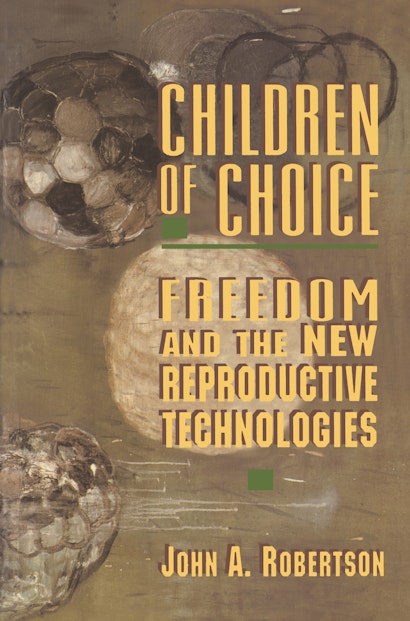Cloning, genetic screening, embryo freezing, in vitro fertilization, Norplant, RU486—these are the technologies revolutionizing our reproductive landscape. Through the lens of procreative liberty—meaning both the freedom to decide whether or not to have children as well as the freedom to control one’s reproductive capacity—John Robertson, a leading legal bioethicist, analyzes the ethical, legal, and social controversies surrounding each major technology and opens up a multitude of fascinating questions: Do frozen embryos have the right to be born? Should parents be allowed to select offspring traits? May a government force welfare recipients to take contraceptives? Robertson’s arguments examine the broad range of consequences of each reproductive technology and offers a timely, multifaceted analysis of the competing interests at stake for patients, couples, doctors, policymakers, lawyers, and ethicists.
"Robertson's ... confrontational style takes the reader to the limits of the possible and beyond, to the extraordinary repercussions of reproductive techniques. This clear and thought-provoking book ... provides rich legal and ethical insights that will challenge and shape one's personal beliefs and professional ethics."—Dilys M. Walker, M.D., The New England Journal of Medicine
"Robertson has laid out, comprehensively and intelligibly, the procreative possibilities open to us now and in the future."—Mary Warnock, New Scientist
"Robertson . . . argues that the principle of procreative liberty should be used to determine the ethics and legalities of the many controversial issues surrounding reproductive technology. . . . Robertson's position may not be universally accepted, but his works are regularly cited and his perspective is given significant coverage in many books on this topic."—Library Journal
"A searching exploration of the ever-expanding parameters of 'choice' written with Solomon-like sagacity."—Kirkus Reviews
"Robertson surveys the available reproductive techniques and options, from abortion and contraception to the various ways of reproducing and of screening for suitable characteristics. The individual and societal conflicts are presented for each option, with Robertson generally arguing in favor of freedom of choice. Should be of interest to students of society as well as the many prospective users of these technologies."—Booklist
"Even if one disagrees with the particular answers which John Robertson gives to the ethical questions raised by the new technology, his book is nonetheless to be welcomed."—Anthony Daniels, Sunday Telegraph
"Robertson is quite good at explaining in advance the order of his arguments; and he provides a comprehensive account of different available methods of contraception, of the various possible treatments either for the remedying of infertility or for allowing single men or women, whether infertile or not, to have children, as well as discussing genetic manipulation."—Mary Warnock, New Scientist
". . . appropriate for students of ethics or anyone else interested in the moral, legal and policy implications of the advances in reproductive technology. . . . Its value lies in its willingness to present all the arguments, leaving the reader to ponder the ethical dilemmas and perhaps come up with some solutions."—Washington Times
"Robertson charts an ethical and legal course through the questions and concern posed by the reproductive techniques that are now available. . . . [He] weaves his way through a tangle of fascinating and often disturbing issues. . . . Children of Choice is indispensable for anyone caring for women, couples, or families—anyone who reaches out for guidance in making reproductive choices. It would also be valuable to women or couples contemplating abortion or the use of infertility services. . . . Well referenced and annotated, this clear and thought-provoking book demands a careful reading. It provides rich legal and ethical insights that will challenge and shape one's personal beliefs and professional ethics."—Dilys M. Walker, New England Journal of Medicine
"Should parents have the right to 'control offspring quality' through genetic screening and manipulation? Should frozen embryos be legally protected? In what ways? How would the introduction of RU486, the 'abortion pill,' change abortion in America? Bioethicist John Robertson tackles these difficult questions and many more in Children of Choice, a comprehensive look at the issues surrounding reproduction in a technological age. . . . a flawlessly researched, thoughtful book."—Los Angeles Times Book Review
"This book is a valuable boost to the perpetual effort of society to overtake and accommodate new technology, specifically that affecting reproduction. . . . A review cannot do justice to the tightly constructed arguments, the endnotes that answer questions that pop into the reader's mind after a particularly controversial viewpoint is advanced, and the myriad case citations that address prior efforts to deal with these issues. . . . Professor Robertson has produced in his characteristic way a well-referenced evaluation that is consistent and coherent although not without controversy."—Journal of the American Medical Association
"Robertson offers the reader a balanced analysis on most reproductive concerns that confront physicians, lawyers, and the general public. . . . [His] broad knowledge makes this a strong book to help people understand these new ethical and legal frontiers."—Choice

